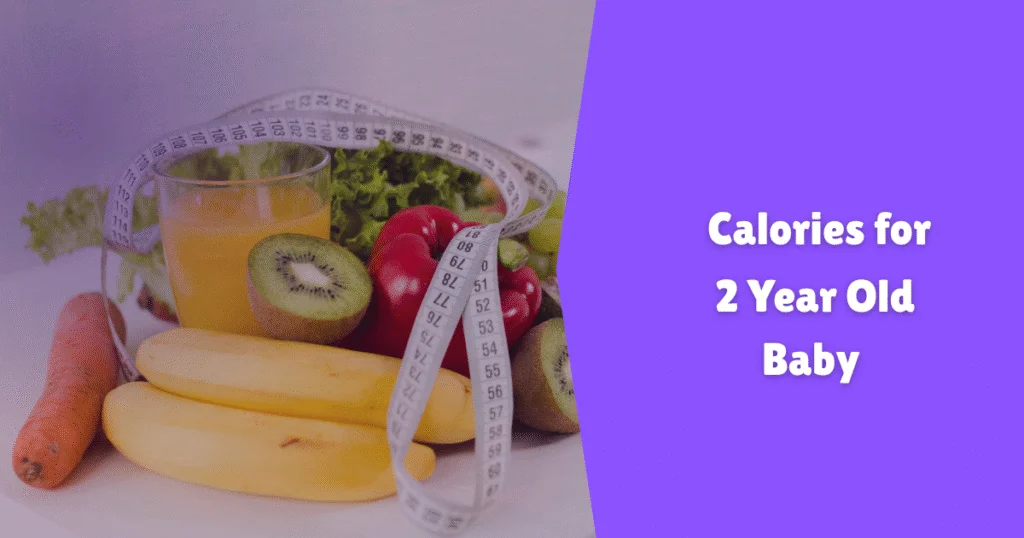Parents often worry if their toddler is not gaining weight as expected. At 2 years of age, children grow at their own pace, but if your child appears underweight or is falling behind on the growth chart, increasing their calorie intake in a healthy and controlled manner becomes essential.
This article explains how many calories a 2-year-old needs to gain weight, what foods to include, and how to create a toddler-friendly meal plan.
Simplify parenting with our app.
Click on This Link

Understanding the Caloric Needs of a 2 Year Old
On average, a healthy 2-year-old requires 1,000 to 1,400 calories per day, depending on their physical activity, metabolism, and overall health. These calories are essential for supporting normal growth, brain development, and daily activities. However, if your 2-year-old is underweight or not gaining adequately, they may need an additional 200 to 300 calories daily, bringing the total to 1,200 to 1,700 calories.
The goal is to provide nutrient-rich foods that contribute to both weight gain and overall development.
How Many Calories Does a 2 Year Old need to Gain Weight?
When thinking about how many calories a 2-year-old needs to gain weight, it’s important to choose healthy sources. Simply adding sugary snacks or fried foods might increase calorie intake, but can compromise nutrition.
Recommended High-Calorie, Nutrient-Dense Foods:
- Full-fat milk and dairy: Cheese, yogurt, and paneer are excellent for growth.
- Nut butters: Smooth peanut butter or almond butter (in age-appropriate, allergy-safe forms).
- Avocados: High in healthy fats, perfect for toast or purees.
- Bananas, mangoes, and sweet potatoes: Rich in energy and vitamins.
- Whole grains: Dalia, oats, whole wheat roti with ghee.
- Lentils and pulses: Add ghee or butter for additional calories.
- Eggs: A complete protein source.
- Homemade ghee-laden laddoos: With jaggery, dry fruits, and besan.
Avoid junk food, processed snacks, sugary drinks, or overfeeding, which may lead to digestive problems and poor eating habits.
Sample Calorie-Rich Daily Meal Plan for a 2 Year Old
Here’s a basic daily meal schedule tailored for a 2-year-old needing extra calories:
Morning (7:30 AM – 8:00 AM)
- Breakfast: 1 boiled egg or 1 banana + whole milk (150 ml) with a spoon of jaggery
- Optional: Small paratha with ghee
Mid-Morning Snack (10:00 AM)
- Snack: Mashed potato with butter OR fruit smoothie (banana + milk + nut butter)
Lunch (12:30 PM)
- Main Meal: Rice with dal and ghee + mashed veggies (carrot, peas) + curd
Afternoon Snack (3:30 PM)
- Snack: Paneer cubes + a date laddoo OR a boiled sweet potato with butter
Dinner (7:00 PM)
- Dinner: Vegetable khichdi with ghee + full-fat yogurt
Bedtime (8:30 PM)
- Drink: Warm milk (100–150 ml) with a pinch of dry fruit powder
This plan can easily provide 1,200–1,500 calories, depending on portion size.
Track Growth, Not Just Weight
While weight is one factor, you should also track:
- Height
- Head circumference
- Milestone achievements
Use WHO growth charts to monitor progress regularly. Always consult a pediatrician if you’re unsure.
Signs Your Toddler Might Need More Calories
Some signs that your child may need to increase their caloric intake include:
- Constant fatigue or low energy
- Refusal to eat or very limited appetite
- Not gaining weight over weeks/months
- Falling below the 5th percentile in growth charts
If these signs persist, speak to a pediatrician to rule out underlying health concerns such as digestive issues, food allergies, or iron/vitamin deficiencies.
When to See a Pediatrician?
Weight issues may be tied to:
- Food allergies or intolerances
- Chronic illnesses (like celiac disease)
- Feeding disorders
- Poor nutrient absorption
If weight gain efforts don’t show improvement within 2–3 months, your pediatrician might recommend further testing or a visit to a pediatric nutritionist.
Tips to Encourage Eating Without Force
Many toddlers are picky eaters or get distracted easily. Here are tips to help:
- Offer small meals every 2–3 hours
- Keep a variety of textures and colors
- Don’t force-feed—offer choices
- Involve them in meal prep (age-appropriate)
- Use fun utensils, colorful plates, or themed mealtimes
Why Nutrition at Age 2 Is So Critical?
At this stage, the brain is rapidly developing, and poor nutrition can have long-term effects on cognition, immunity, and physical development. Ensuring the right calorie intake now supports:
- Brain growth
- Muscle development
- Strong immunity
- Healthy eating habits for life
Why Download KidsCur?
So, how many calories does a 2-year-old need to gain weight? The general range is 1,200 to 1,700 calories per day, depending on the child’s weight, activity level, and metabolic needs. By focusing on balanced, calorie-rich meals, regular feeding intervals, and nutrient-dense snacks, you can promote healthy and steady weight gain in your toddler.
Always consult your child’s pediatrician before making significant dietary changes, and ensure any concerns about development or growth are professionally addressed.
KidsCur is a parenting app that has multiple features that will help you to support your children in their growth. Download the app to learn more about it!
FAQs
Q 1: Can I give my toddler protein powder to gain weight?
Answer: Generally not recommended unless prescribed by a doctor. Natural protein sources like eggs, paneer, and lentils are safer.
Q 2: Should I give sweets and chocolates to increase calories?
Answer: Occasionally is fine, but they should not replace healthy, nutritious foods.
Q 3: How fast will my 2-year-old gain weight after increasing calories?
Answer: Expect slow but steady weight gain. Around 150–300 grams per month is typical if calorie needs are being met.

